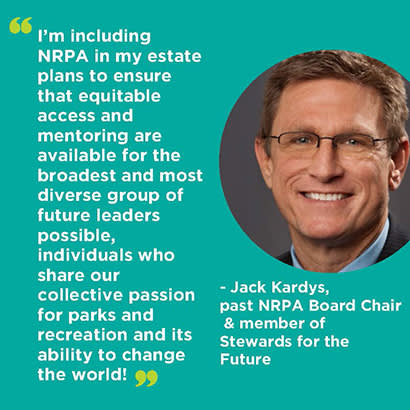You can help ensure parks and recreation will be there for generations to come by designating the National Recreation and Park Association (NRPA) as a beneficiary in your will, trust, IRA, retirement account or life insurance plan.
This month, you can set your intentions for the new year by creating a will in 20 minutes or less through our partner FreeWill.
Learn More
When you designate NRPA as a beneficiary in your estate plan, you become a member of Stewards for the Future. Your membership helps ensure NRPA, alongside park and recreation professionals, can leverage the power of parks and recreation to build strong, vibrant and resilient communities.
You can become a Stewards for the Future member at any stage in your life, and you can alter your bequest as your circumstances change.
“The park and recreation profession profoundly influenced and impacted my family's life, providing a remarkable perspective for equity and the healthy design and programming of public spaces. NRPA’s professional development and Board engagement were vital opportunities that my mentor Chuck Pezoldt, Ph.D., coached me toward. I'm including NRPA in my estate plans to ensure that equitable access and mentoring are available for the broadest and most diverse group of future leaders possible, individuals who share our collective passion for parks and recreation and its ability to change the world,” says Jack Kardys, past NRPA Board Chair and member of Stewards for the Future.
Benefits of Stewards for the Future Membership
- Special recognition
- Invitations to NRPA events and educational opportunities
- Comfort knowing your commitment to parks and recreation has a lasting impact
Sign Up Now
Ways to Become a Stewards for the Future Member
Bequest by Will or Revocable Trust
You may identify NRPA as the beneficiary of a certain amount, specific asset, or percentage of your estate under your Will or Revocable Trust. Although you will not receive any tax benefits during your lifetime, following your passing, your estate may be eligible to take income and estate tax charitable deductions for the testamentary bequest to NRPA.
Email development@nrpa.org for more options.
|
Sample language to bring to your attorney:
I give, bequeath and devise to the National Recreation and Park Association, Incorporated (Tax ID #13-5563001), located in Ashburn, Virginia, the sum of $______ (or asset) to be used for its general support (or for the support of a specific fund or program).
|
NRPA has partnered with FreeWill to provide you free online tools
You can make a gift to NRPA in your will or trust. Create a will in 20-mintues or less.
Have you already made a gift to NRPA in your will or trust? All you have to do now is fill out this form to let us know. We would love to say thank you for prioritizing NRPA in your lasting legacy.
Did you know that there are assets that may not be included in your will or trust? These are called non-probate assets and you may need to plan for them separately. You can designate NRPA as a beneficiary of these types of assets which include but are not limited to an IRA and a 401(k). Learn more.
IRA Assets or Other Qualified Retirement Benefits
You can designate NRPA as a partial, contingent or sole beneficiary of your IRA or other qualified retirement plans, such as your 401(k), 403(b), Keogh plan or profit-sharing pension. Designating NRPA as a beneficiary of your retirement account(s) is a tax-efficient way to maximize support for NRPA, as the amount distributed to NRPA will not be subject to income tax and will qualify for the estate tax charitable deduction. Be sure to review your plan documents and obtain any necessary approvals.
In addition, if you are over 70½ years old, you may make a qualified charitable distribution of up to $100,000 per year from your IRA directly to NRPA without having to include the amount distributed as income for federal income tax purposes. No charitable deduction may be taken, but such distributions will qualify for all or part of the IRA’s required minimum distributions. Be sure to share this gift plan with your financial or tax advisor.
Life Insurance
You can designate NRPA as the beneficiary of all or a percentage of your life insurance policy proceeds, which will be deductible for estate tax purposes following your passing. You may also irrevocably transfer ownership of a paid-up life insurance policy to NRPA during your lifetime and may take an income tax charitable deduction for the current value of the policy.
Certificates of Deposit, Savings or Brokerage Accounts
A simple way to provide for the future of our parks and recreation is by making NRPA the “pay on death” beneficiary of the account. Charitable contributions made in this manner are treated the same as testamentary bequests for tax purposes.
Donor-Advised Funds
Final distribution of contributions remaining in a donor advised fund is usually governed by the terms of the agreement at the time the fund was created. You can name NRPA as a successor beneficiary or designate NRPA to receive a portion of the remaining account value, leaving the balance for your family or friends to continue your legacy of philanthropy.
Split-Interest Charitable Trusts
If you would like to benefit NRPA while obtaining an upfront income tax charitable deduction, and also potentially benefitting family members, you may consider a lifetime gift to an irrevocable charitable lead or charitable remainder trust. These trusts are structured to make distributions to charity either during or at the end of the trust term, and they may support individual beneficiaries at certain times. You should discuss these and other more advanced planned giving opportunities with your tax advisors.
To learn more about planned giving and joining Stewards for the Future, email development@nrpa.org.


